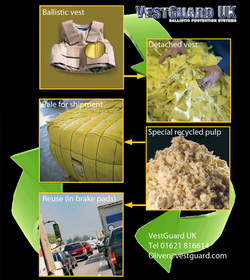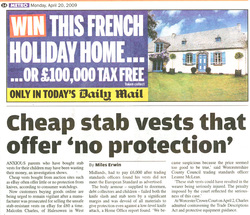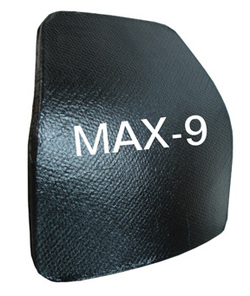Two major investors and the founder of a Chandler company that makes armor for U.S. soldiers are in a four-year legal battle for control that has led to a disputed Bankruptcy Court filing.
William Perciballi, ArmorWorks Enterprise LLC founder and manager, filed June 17 for a Chapter 11 reorganization of the company in U.S. Bankruptcy Court. Investors Eric and Timothy Crown of C Squared Capital Partners LLC responded June 20 with a emergency motion to dismiss the bankruptcy filing. Their attorneys argued that Perciballi was not authorized to file for bankruptcy without the consent of Anchor Management LLC, which represents C Squared as a manager of ArmorWorks. Perciballi offered to buy out the Crowns out for $6.1 million or have them buy him out for $15 million.
“These bankruptcy cases are not about reorganizing creditor-debtor relationships,” the Crowns’ motion said. “Rather, they appear to be another attempt by Perciballi to take ownership and control of (ArmorWorks) from the C Squared parties.”
ArmorWorks benefited from the U.S. military’s involvement in Iraq and Afghanistan, supplying high-tech ceramic body armor to American troops and armor for Humvees, helicopters and Navy landing craft to protect against
land mines and improvised explosive devices. The company grew from a dozen employees in September 2001 to 350 in December 2009.
ArmorWorks reported $733 million in sales over the past four years, but the military contractor lost $10 million on sales of $100 million in 2012. ArmorWorks Enterprises was formed in 2001 with Perciballi as the
majority partner with a 60 percent stake in the company. C Squared invested $1 million for a 40 percent stake, according to Perciballi’s Chapter 11 filing.
ArmorWorks paid a return of $21.6 million to C Squared on that investment, Perciballi said in a declaration filing.
Morrie Aaron, president of MCA Financial Group, who is representing Perciballi, said a hearing is set for July 12 on the motion to dismiss and on debtor-in-possession financing of $3.5 million for ArmorWorks from a private lender.
ArmorWorks’ sales peaked at $313 million in 2011 after the company landed a $236 million contract to upgrade armor for U.S.Humvees.
The company briefly ran into trouble in September 2008 when its body armor failed more stringent military standards, but, 15 months later, it won a contract worth as much as $21.6 million. Despite the company’s growth and lucrative military contracts, ArmorWorks could not protect itself from an internal battle that surfaced in the summer of 2009 involving the C Squared investors.
Eric and Timothy Crown were founders of Insight Enterprises Inc., a Tempe-based technology company they started in 1986.Within 20 years it was one of Arizona’s largest companies with $5 billion in annual revenue.
Timothy Crown is chairman of the board of Insight. Eric Crown resigned from the board of directors in 2007 at the time of a federal investigation of Insight that involved stock-option awards.
The Crowns are represented on the bankruptcy filing over ArmorWorks by Steven Jerome of Snell & Wilmer.
Jerome did not respond to attempts to reach him for comment.
The Crown’s dispute with Perciballi centers on a 2001 operating agreement that was not fully executed. The Crowns signed the document that they say established Perciballi and Anchor Management as managers of
ArmorWorks. Perciballi signed the operating agreement as manager of ArmorWorks but left the document blank where he was supposed to sign as president of the company, according to the Crowns’ filing.
Perciballi said in his bankruptcy filing that it was always understood that he would have sole authority as day-to-day manager of manager of ArmorWorks, the Crowns would be passive investors and Anchor Management would be a passive manager.
In August 2008, Perciballi and the Crowns agreed to raise Perciballi’s salary from $150,000 to $500,000 and pay Anchor Management $200,000 in a consulting agreement that would allow it to “assist the company is
nalyzing potential strategic alternatives.”
Perciballi filed amended corporate documents 11 months later to remove Anchor as a manager of ArmorWorks when the Crowns said they were out of the country. Anchor responded with a letter calling Perciballi’s action
illegal. In May 2011, the Crowns filed suit in Maricopa County Superior Court to reinstate Anchor as a manager of ArmorWorks. The court ruled in favor of C Squared to reinstate Anchor as an ArmorWorks manager in April and denied Perciballi’s request for a stay when he appealed in May. His attorneys followed with a Chapter 11 bankruptcy filing June 17. The document lists ArmorWorks assets at $30.9 million, including $959,000 in
cash, $8.6 million in inventory and $3.67 million in accounts receivable. The companies liabilities are listed as $12 million.
Perciballi explained in the filing that with reorganization of the company he expects to “weather the storm.”
Aaron, Perciballi’s financial adviser, said the Chapter 11 filing allows ArmorWorks to shed some leases, obtain working capital and work out a plan to pay its creditors over five years with interest.
If all goes well, ArmorWorks could work through the reorganization in four to six months, he said.
“The ongoing litigation with C Squared has made it impossible for ArmorWorks to obtain capital financing to replace the $40 million line of credit paid off in 2012,” he said. The reorganization plan indicates that ArmorWorks will pay all of its creditors in full.
The plan also provides for Perciballi to buy out C Squared or sell his interest to the Crowns
Vestguard UK Shaun Ward founder and CEO of Vestguard said " ArmorWorks were making some big claims over having the lightest plates in the world so we purchased some and tested them independently in the UK however they did not meet the standards they claimed, so we stayed well away from ArmorWorks. I was surprised to hear that they won the body armour contract, but these thing happen I hope that they are able to sort their problems out.
William Perciballi, ArmorWorks Enterprise LLC founder and manager, filed June 17 for a Chapter 11 reorganization of the company in U.S. Bankruptcy Court. Investors Eric and Timothy Crown of C Squared Capital Partners LLC responded June 20 with a emergency motion to dismiss the bankruptcy filing. Their attorneys argued that Perciballi was not authorized to file for bankruptcy without the consent of Anchor Management LLC, which represents C Squared as a manager of ArmorWorks. Perciballi offered to buy out the Crowns out for $6.1 million or have them buy him out for $15 million.
“These bankruptcy cases are not about reorganizing creditor-debtor relationships,” the Crowns’ motion said. “Rather, they appear to be another attempt by Perciballi to take ownership and control of (ArmorWorks) from the C Squared parties.”
ArmorWorks benefited from the U.S. military’s involvement in Iraq and Afghanistan, supplying high-tech ceramic body armor to American troops and armor for Humvees, helicopters and Navy landing craft to protect against
land mines and improvised explosive devices. The company grew from a dozen employees in September 2001 to 350 in December 2009.
ArmorWorks reported $733 million in sales over the past four years, but the military contractor lost $10 million on sales of $100 million in 2012. ArmorWorks Enterprises was formed in 2001 with Perciballi as the
majority partner with a 60 percent stake in the company. C Squared invested $1 million for a 40 percent stake, according to Perciballi’s Chapter 11 filing.
ArmorWorks paid a return of $21.6 million to C Squared on that investment, Perciballi said in a declaration filing.
Morrie Aaron, president of MCA Financial Group, who is representing Perciballi, said a hearing is set for July 12 on the motion to dismiss and on debtor-in-possession financing of $3.5 million for ArmorWorks from a private lender.
ArmorWorks’ sales peaked at $313 million in 2011 after the company landed a $236 million contract to upgrade armor for U.S.Humvees.
The company briefly ran into trouble in September 2008 when its body armor failed more stringent military standards, but, 15 months later, it won a contract worth as much as $21.6 million. Despite the company’s growth and lucrative military contracts, ArmorWorks could not protect itself from an internal battle that surfaced in the summer of 2009 involving the C Squared investors.
Eric and Timothy Crown were founders of Insight Enterprises Inc., a Tempe-based technology company they started in 1986.Within 20 years it was one of Arizona’s largest companies with $5 billion in annual revenue.
Timothy Crown is chairman of the board of Insight. Eric Crown resigned from the board of directors in 2007 at the time of a federal investigation of Insight that involved stock-option awards.
The Crowns are represented on the bankruptcy filing over ArmorWorks by Steven Jerome of Snell & Wilmer.
Jerome did not respond to attempts to reach him for comment.
The Crown’s dispute with Perciballi centers on a 2001 operating agreement that was not fully executed. The Crowns signed the document that they say established Perciballi and Anchor Management as managers of
ArmorWorks. Perciballi signed the operating agreement as manager of ArmorWorks but left the document blank where he was supposed to sign as president of the company, according to the Crowns’ filing.
Perciballi said in his bankruptcy filing that it was always understood that he would have sole authority as day-to-day manager of manager of ArmorWorks, the Crowns would be passive investors and Anchor Management would be a passive manager.
In August 2008, Perciballi and the Crowns agreed to raise Perciballi’s salary from $150,000 to $500,000 and pay Anchor Management $200,000 in a consulting agreement that would allow it to “assist the company is
nalyzing potential strategic alternatives.”
Perciballi filed amended corporate documents 11 months later to remove Anchor as a manager of ArmorWorks when the Crowns said they were out of the country. Anchor responded with a letter calling Perciballi’s action
illegal. In May 2011, the Crowns filed suit in Maricopa County Superior Court to reinstate Anchor as a manager of ArmorWorks. The court ruled in favor of C Squared to reinstate Anchor as an ArmorWorks manager in April and denied Perciballi’s request for a stay when he appealed in May. His attorneys followed with a Chapter 11 bankruptcy filing June 17. The document lists ArmorWorks assets at $30.9 million, including $959,000 in
cash, $8.6 million in inventory and $3.67 million in accounts receivable. The companies liabilities are listed as $12 million.
Perciballi explained in the filing that with reorganization of the company he expects to “weather the storm.”
Aaron, Perciballi’s financial adviser, said the Chapter 11 filing allows ArmorWorks to shed some leases, obtain working capital and work out a plan to pay its creditors over five years with interest.
If all goes well, ArmorWorks could work through the reorganization in four to six months, he said.
“The ongoing litigation with C Squared has made it impossible for ArmorWorks to obtain capital financing to replace the $40 million line of credit paid off in 2012,” he said. The reorganization plan indicates that ArmorWorks will pay all of its creditors in full.
The plan also provides for Perciballi to buy out C Squared or sell his interest to the Crowns
Vestguard UK Shaun Ward founder and CEO of Vestguard said " ArmorWorks were making some big claims over having the lightest plates in the world so we purchased some and tested them independently in the UK however they did not meet the standards they claimed, so we stayed well away from ArmorWorks. I was surprised to hear that they won the body armour contract, but these thing happen I hope that they are able to sort their problems out.



 RSS Feed
RSS Feed